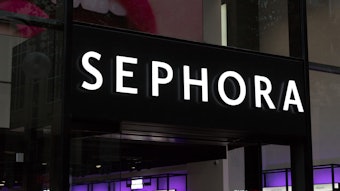Digital think tank L2 released its fifth annual Digital IQ Index: Beauty report, which benchmarks the digital competence of 85 global beauty brands across metrics for site, digital marketing, social media and mobile. From NYU Stern clinical professor of marketing Scott Galloway, the report also offers industry trend analysis, exclusive data on beauty brands’ social media efforts and digital campaigns, and highlights particular efforts in its “Flash of Genius” case studies.
The report notes that e-commerce growth in beauty for 2013 is projected to be over 29%, topping out the growth of all other soft goods sectors online results. This is important because more than a third of consumers increasingly turn to online influencers before purchasing beauty products. According to a graphic in the report sourced from Consumer Barometer, Google, IAB Europe and TNS Infratest, 33% of North American beauty consumers research products online before purchasing offline—and those numbers are outpaced by Europe (36%) and South America (38%), with Asia trailing closely (31%).
Major beauty players are increasing their digital marketing and advertising budgets, and are working more and more with online retailers, and new avenues in media to reach consumers include live video chat, loyalty programs, auto-replenishment systems and sampling programs. According to a report graphic based on the A.T. Kearney report from March 2012 called “Beauty and the Beast,” when asked their favorite online channel for North American personal care and beauty purchases, 27% said Amazon, 18% said Sephora, 11% all major drug and mass outlets (which includes Walgreens, CVS, Walmart and Target), 10% said brand sites, 8% said Drugstore.com, 7% said Ebay, 6% said department stores, and 13% said other.
The Digital IQ Index report attempts to quantify the digital competence of 85 beauty brands across three categories: skin care, color cosmetics and fragrance. The aim is to provide a tool for identifying strengths and weaknesses, helping brands achieve greater return on incremental investment. This edition of the report gave the following digital competence rankings for beauty brands:
1. Lancôme
2. Kiehl’s
3. L’Oréal Paris
4. Benefit
4. Bobbi Brown
4. Estée Lauder
7. Clinique
8. Aveda
9. Bare Escentuals
9. MAC
11. Clarins
12. Smashbox
13. Victoria’s Secret
14. em Michelle Phan
15. Elizabeth Arden
15. L’Occitane
15. Maybelline New York
18. Urban Decay
19. CoverGirl
19. Proactiv
21. Olay
22. Burt’s Bees
23. Avon
23. Giorgio Armani Beauty
23. Mary Kay
26. Origins
26. Tarte
28. Chanel
29. Murad
30. Clarisonic
30. Jo Malone
30. Neutrogena
33. Perricone MD
34. Yves Saint Laurent
35. Nars
35. Ralph Lauren
37. SkinCeuticals
38. La Mer
38. Laura Mercier
38. Revlon
41. Essie
41. Make Up For Ever
43. Gucci
43. Juicy Couture
43. Sally Hansen
46. Michael Kors
47. Garnier
48. Burberry
48. Dior
50. La Roche-Posay
50. Nivea
50. Physicians Formula
50. Shiseido
50. Simple
55. Vichy
56. Philosophy
56. Thierry Mugler
58. Calvin Klein
59. Caudalie
60. Rimmel
61. Almay
61. Clean & Clear
61. Fresh
64. Aveeno
64. Bioré
66. La Prairie
66. Trish McEvoy
68. Marc Jacobs
69. SK-II
70. Cetaphil
70. Donna Karan
70. Pond’s
73. Hugo Boss
74. Lacoste
75. Iman
76. Dolce & Gabbana
76. NYC New York Color
78. OPI
79. Wet n Wild
80. Prada
81. Jean Paul Gaultier
81. Viktor & Rolf
83. 007 Men’s Fragrances
84. Puma
85. Vera Wang
Get more information and order details about the report here.










